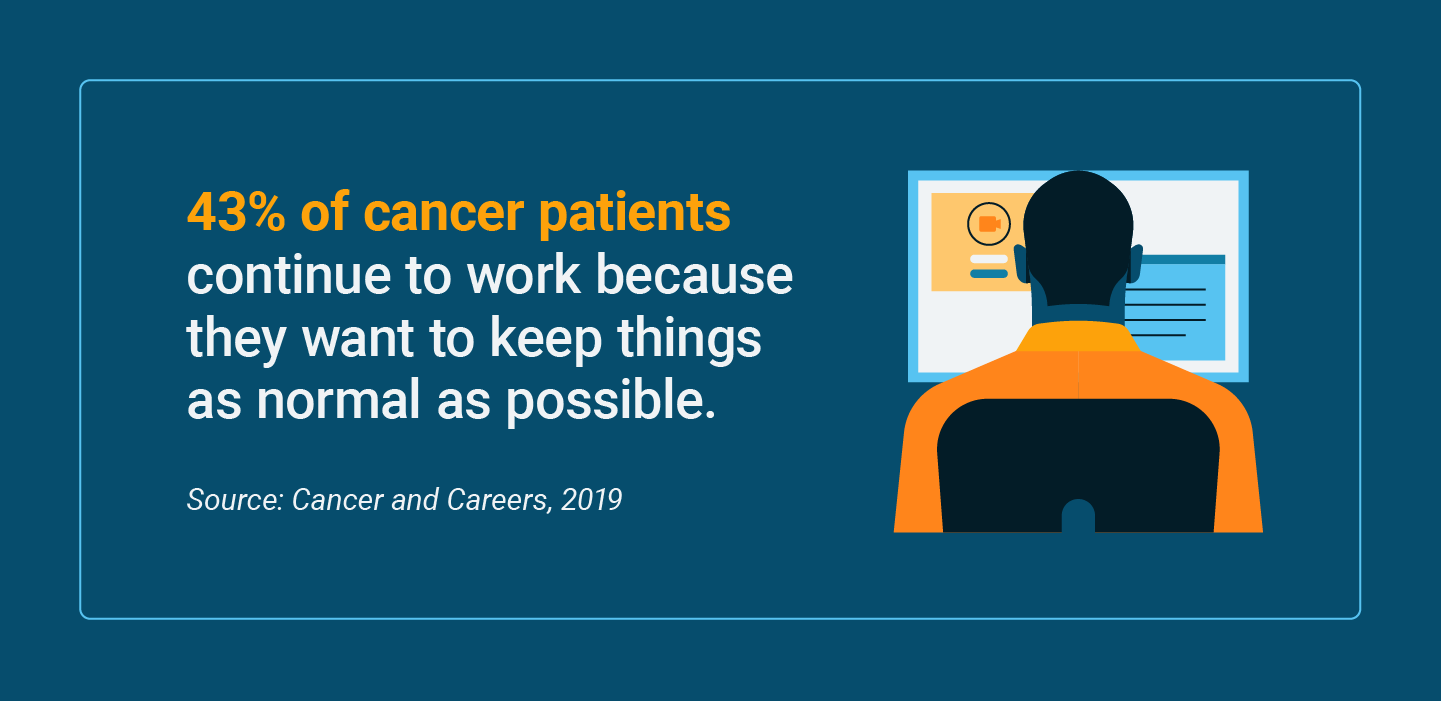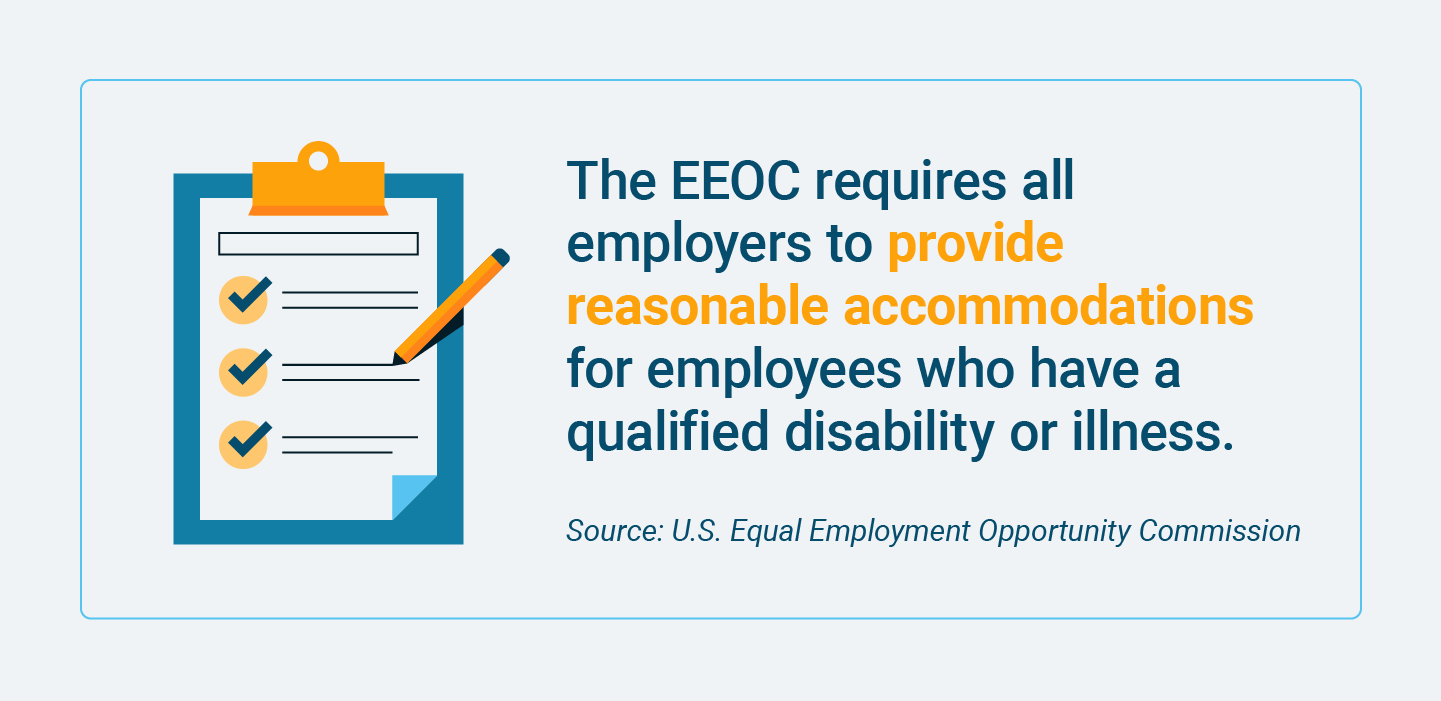Working During Cancer Treatment: How to Communicate With Employers
Written by Karen Selby, RN | Edited By Walter Pacheco
Can You Work During Cancer Treatment?
Deciding whether or not you should continue working is a personal decision and one that depends on your circumstances and preferences. The factors you’ll want to take into consideration are:
- Your type of work
- The stage of your cancer
- What type of treatment you are receiving
- Your side effects and symptoms
Those who are going through more aggressive treatments for diseases such as mesothelioma, which can involve a combination of radiation, chemotherapy and surgery, may not be able to work as much as those whose pain is more manageable.
A Cancer and Careers survey found that 46% of cancer patients chose to continue working because they felt well enough to do so. The same survey found that 43% of cancer patients continue to work because they want to keep things as normal as possible.

Advise your employer on your treatment and the possible side effects that come with it. They can help you determine if your treatment will affect your day-to-day routine and ability to work. Everyone responds to treatment differently, so this decision will ultimately come down to how much you can handle — physically and emotionally.
Do I Need To Tell My Employer I Have Cancer?
For an employer to accommodate your needs during your treatment, it’s best to let them know about your diagnosis. How much information you disclose is your decision.
Telling Your Manager You Have Cancer
Consult with your doctor before meeting with your boss to make sure you have a set treatment plan. This will make it easier to come up with fair adjustments to your work schedule if needed.
Once you’re clear on your treatment schedule, set up a private meeting with your manager to discuss your diagnosis further. Communicate your needs and any accommodations you may feel are necessary, such as working from home, taking time off for appointments or developing a flexible schedule. It may be a good idea to set up a meeting with your human resources department to develop a concrete plan that you and your manager can agree upon.
Telling Your Co-workers You Have Cancer
Disclosing your health conditions to your co-workers is a personal choice. If you do decide to share your illness, make sure it’s with individuals you trust. Decide how much information you want to share and how you want to share it.
For example, you can send an email to a few trusted co-workers, set up an impromptu lunch meeting or designate one co-worker to tell your team. Remember, disclosing your diagnosis to your co-workers is optional, but it may be helpful to know you have their support.
Understanding Your Rights in the Workplace
There are federal and state laws that protect your rights as an employee and prohibit discrimination against those with an illness such as cancer.

Americans with Disabilities Act
The Americans with Disabilities Act (ADA) protects employees from losing their jobs due to their disability. To be protected by the ADA, one must have a qualified disability, which is defined as any physical or mental impairment that limits one or more life activities.
The Equal Employment Opportunity Commission (EEOC) enforces the ADA and requires employers to provide “reasonable accommodations” to all employees with a qualified disability. Reasonable accommodations are any changes to a job, job function or work environment that allow a person with a disability to adequately perform their job duties.
- A change in job tasks
- A flexible work schedule
- Reassigning duties or responsibilities to another employee temporarily or permanently
- Time off for appointments
- Changes to the work environment to make it more comfortable
- Ability to work remotely
For the accommodations to be deemed reasonable, they must not create undue hardship or direct threat. Similar to the ADA, the Rehabilitation Act prohibits disability discrimination and protects the rights of those working in the federal sector — such as with the U.S. Postal Service.
Family and Medical Leave Act
The Family and Medical Leave Act (FMLA) protects the jobs of those with an illness and allows qualified employees to take up to 12 weeks of unpaid leave per year. This leave can be used intermittently, meaning employees can choose to take the days off in separate blocks, such as two weeks at a time, or on a single day.
This allows cancer patients to take a few days off here and there during their chemotherapy treatments or weeks at a time for any screenings, surgeries or more intensive care.
To be eligible for this medical leave, you must have worked for your employer for at least 12 months, have worked 1,250 hours and be employed at a covered company with at least 50 employees.
5 Tips for Continuing Work During Cancer Treatment
If you decide to continue working during your treatment, there are many ways you can handle your day-to-day work life and still prioritize your health.
1. Decide on Fair Accommodations with Your Employer
Employers are required to provide reasonable accommodations to employees experiencing illnesses, but what they allow can vary depending on the situation. Always advocate for yourself in the workplace so your employer understands your needs.
For example, the ability to work from home could be a great option if you’re going through chemotherapy. This will help your energy levels since you won’t have to commute to the office and can have the ability to rest when needed.
A flexible schedule is also a great option to agree on with your employer. Having flexible hours can help make it easier to schedule appointments and rest after treatments. When asking for accommodations, make sure your employer knows you’ll still be able to fulfill your job duties with these changes.
2. Plan Your Treatment Appointments Around Your Work Schedule
It’s important to be conscious of when you’re scheduling appointments. Since you can’t always predict how you’re going to feel after treatment, try making appointments later in the day or close to the weekend so you have time to rest and recover. This will also ensure they don’t interfere with your work schedule.
3. Keep Your Managers and Co-Workers Updated
The lingering effects of chemotherapy can sometimes come when you least expect them. If you aren’t feeling your best one day and need some time to rest, make sure you’re communicating this to your manager and co-workers. Also, if there are any changes to your treatment plan, make sure you pass that information on to your boss. These changes should always be brought up as soon as possible so your team can make adjustments and accommodations as needed.
4. Set Boundaries
If you decide to work during your treatment, set boundaries and understand how much you can realistically handle. Avoid overexerting yourself and taking on too much work that will make you feel worse. If you’re at work all day, allow yourself to rest when you get home. Stay on top of your tasks by creating a daily schedule, making sure to pencil in times for rest periods to regain your energy.
5. Ask for Help
Whether at work or home, ask for help when you need it. Lean on co-workers for support with job-related tasks and don’t be afraid to reach out. If you’ve communicated your diagnosis with them, they’ll likely be willing to lend a helping hand. Aside from work, ask family members to help out with daily household tasks so you can have time to rest after work.
What To Do If You Can’t Work
For some, the side effects of chemotherapy can make it hard to keep up with job tasks, even with time off and other job accommodations. In this case, taking a leave from work could be the best option.
If your treatment requires you to leave work for an extended period, your employer may offer short-term disability benefits. With employer-provided short-term disability, you can receive a percentage of your salary if you are no longer able to perform your job duties due to your illness. This can help cover some of your salary and ensure medical coverage.
If you decide to quit your job, you might qualify for federal Social Security benefits such as Supplemental Security Income (SSI) or Social Security Disability Insurance (SSDI). This type of financial support is available to you if:
- You have limited income due to your medical condition
- Your medical condition keeps you from working for at least one year
- You have been living with the condition for at least five months
Leaving your job often results in the loss of health insurance benefits, but programs such as COBRA can provide temporary coverage. When you lose your employee health insurance, COBRA allows you to extend your coverage from your former employer for up to 36 months. This option is often a lot more expensive since you will have to cover the cost of insurance premiums. You can also sign up for an Affordable Care Act health plan or try qualifying for Medicaid.
A job is a huge part of our daily lives and taking time off can be a big transition. If you’re having trouble with this life change, try joining cancer support groups or take on a few passion projects to help keep you busy.
Whether continuing to work or deciding to take time off, adjusting to this new normal can take some time. Ease into it and remember to take care of your health first. The impact of mesothelioma treatment is different for everyone, but there are many ways you can balance your health and your job during your journey.







